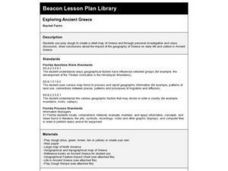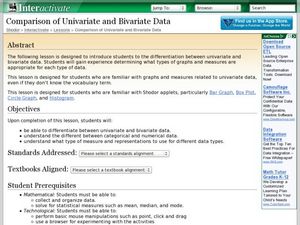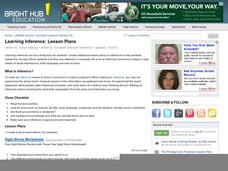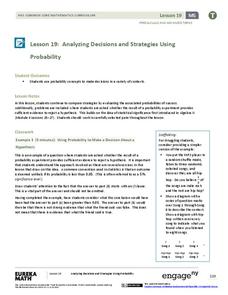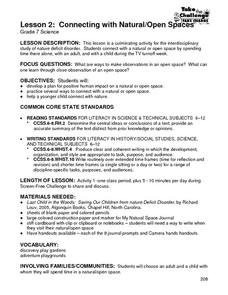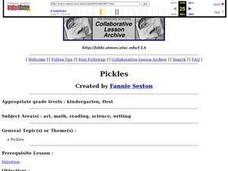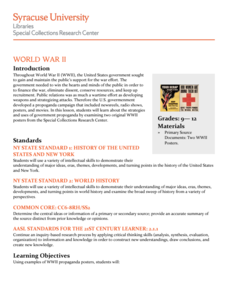Curated OER
Float Your Boat
Students investigate buoyancy, displacement and density. For this flotation lesson students study the Archimedes' Principle, analyze data and draw conclusions.
Curated OER
One Plus One Makes New
Students discover the properties of matter and how they change when composite materials are produced. In this informative activity students write up a question and procedure to an experiment then analyze and draw conclusions based on...
Curated OER
Investigating the Probability
Learners investigate probability using coins and dice. They collect data, graph, organize and interpret data. They predict, describe, compare, compute and draw conclusions based on what they observe and record.
Curated OER
Suspect Sources at the Republican Debate
Students explore and analyze statements made during a televised presidential debate. In groups, they research and test the validity of the statements made by the presidential contenders. Students examine sources and draw conclusions on...
Curated OER
Exploring Ancient Greece
Sixth graders use play dough to create a relief map of Greece and through personal investigation and class discussion, draw conclusions about the impact of the geography of Greece on daily life and culture in Ancient Greece.
Curated OER
There's a Place That Has a Race
Students define the term "place," collect data about Alaska and the Iditarod from several web sites, take online quiz using information gathered, and draw conclusions based upon their data collection and analysis.
Curated OER
CAN'T TOUCH THIS!
Middle schoolers discover the best practical shielding material when dealing with radioactive substances. They draw conclusions based on availability of materials, price, and best shielding properties.
Curated OER
Architecture Drawing/ Door And Window Schedules
Students engage in the study of door and window schedules while focusing on the headings. They practice drawing the plans for installing windows and doors into a home and cover the process of ordering supplies and arranging installation.
Curated OER
Paragraph Lesson
Students write paragraphs with topic sentences and supporting details. In this paragraph writing lesson, students fix sentences and paragraphs. Students also write a paragraph that includes an introduction, supporting details, and a...
Curated OER
The Aging Brain: A Lesson on Alzheimer's Disease
Students investigate the aging brain and its relationship to the occurrence of Alzheimer's disease. They need to have prior knowledge of brain and nervous system anatomy in order to participate in this lesson. Students compare an aging...
Curated OER
Comparison of Univariate and Bivariate Data
Learners explore the concept of univariate and bivariate data. For this univaritate and bivariate data lesson, pupils discuss the differences between univariate and bivariate data. They work sample problems where they must construct box...
Curated OER
Impromptu Speech
Focus on presentation techniques with this instructional activity, which prompts middle schoolers give an impromptu speech. They practice public speaking by giving a short unprepared speech. Some preparations are made to include an...
Curated OER
Linear Regression and Correlation
Learners explore scatter plots. For this linear regression lesson, groups of pupils graph scatter plots and then find the line of best fit. They identify outliers and explain the correlation. Each group summarizes and shares their...
Curated OER
Learning Inference
Making inferences can be a tricky proposition for middle schoolers. In the lesson presented here, pupils practice the skill of drawing a conclusion and making a judgment - which are what making an inference is all about! There are five...
NTTI
Vectors: Traveling, But in What Direction
High schoolers watch a video of real-world situations regarding speed, direction, velocity, force, etc. and answer questions while viewing. They then practice drawing and using vectors to solve more real-world problems.
EngageNY
Analyzing Decisions and Strategies Using Probability 2
Explore how to compare and analyze different strategies. In the 20th installment of a 21-part module, scholars continue their analysis of decisions and strategies from the previous lesson. They then extend this concept to hypothesis...
Take the challenge
Connecting with Natural/Open Spaces
Get your class outside, away from the television, and maybe even learning something about nature while they're at it. Individuals will chose an open, natural space to spend time in for several days. Each day they will complete a page in...
American Statistical Association
More Confidence in Salaries in Petroleum Engineering
Making inferences isn't an exact science. Using data about salaries, learners investigate the accuracy of their inferences. Their analyses includes simulations and randomization tests as well as population means.
Council for Economic Education
Banks and Credit Unions (Part 1)
Imagine you have money you want to save ... where do you put it? Pupils investigate the similarities and differences of banks and credit unions as they determine where exactly to place their hard-earned money. Through a WebQuest, they...
Science 4 Inquiry
The Ins and Outs of Photosynthesis
The most important chemical process on Earth is photosynthesis. Scholars explore the changes in the gases in our atmosphere as life on Earth developed. They create a model of photosynthesis and consider simple questions.
Curated OER
Waves
Light waves and sound waves are the focus of this science lesson designed for 5th graders. Besides discovering how these waves travel, learners also discover the basic properties of waves, and analyze data tables and graphs. The...
Curated OER
Pickles
Young learners compare healthy foods to junk foods. They examine the growing process of a vegetable from a seed all the way to maturity. The book, The Magic School Bus in a Pickle is used. Some nice cross-curricular activities in math,...
Chicago Botanic Garden
Plant Phenology Data Analysis
Beginning in 1851, Thoreau recorded the dates of the first spring blooms in Concord, and this data is helping scientists analyze climate change! The culminating instructional activity in the series of four has pupils graph and analyze...
Syracuse University
World War II
During World War II propaganda was as important to the war effort as the soldiers in the field. Scholars consider how the government communicated messages of patriotism with propaganda by examining pieces from World War II. Then, they...






